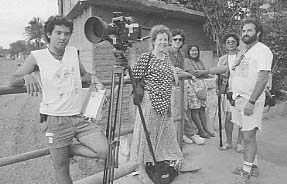 Maureen Gosling’s documentary, Blossoms of Fire (2000), goes behind the mythic “Juchitan matriarchy,” a Mexican town that is supposedly run all by women. The myth is only half wrong: women run most of the local businesses, but it is a gender balance based on a mutual work ethic that has evolved over centuries. From here, Gosling’s story spirals outward, expanding until it encompasses all members of the villages, all aspects of their history and culture—and it’s amazingly fascinating. She approaches Juchitán in the tradition of Robert Flaherty, with expert attention to the customary poetics in their cooking, their clothes, their crafts. Local musicians color the film on-screen and on the soundtrack; one memorable scene involves a man singing and playing harmonica while playing a bass improvised out of a stick, a string, and a bucket. Where Gosling deviates from Flaherty is in the town’s present and future: Flaherty was obsessed with tradition and ritual in a pre-industrial state; Gosling is fascinated with Juchitán’s resistance to globalization and the influx of corporate influence—which the town has thwarted so far successfully through vibrant protests. And this is the key thread of the film: a town that has held on to its roots, and continues to preserve them. The school still teaches the local dialect; Juchitán also elected the first liberal, local government during the reign of the one-party system; after Elle Magazine slandered local women in an issue, the town brought libel charges against the French magazine. What Gosling has found in this small town is a community that stands up for itself and wants to preserve its own unique image and history—it doesn’t want to be like everywhere else. It resists all aspects of modernization: human-made craftsmanship over mass production, homegrown over laboratory foods, the local marketplace over the supermarket. Gosling, with her detail-oriented camera, observes the intimate kinesis of a community at work and translates it on to film fluidly.
Maureen Gosling’s documentary, Blossoms of Fire (2000), goes behind the mythic “Juchitan matriarchy,” a Mexican town that is supposedly run all by women. The myth is only half wrong: women run most of the local businesses, but it is a gender balance based on a mutual work ethic that has evolved over centuries. From here, Gosling’s story spirals outward, expanding until it encompasses all members of the villages, all aspects of their history and culture—and it’s amazingly fascinating. She approaches Juchitán in the tradition of Robert Flaherty, with expert attention to the customary poetics in their cooking, their clothes, their crafts. Local musicians color the film on-screen and on the soundtrack; one memorable scene involves a man singing and playing harmonica while playing a bass improvised out of a stick, a string, and a bucket. Where Gosling deviates from Flaherty is in the town’s present and future: Flaherty was obsessed with tradition and ritual in a pre-industrial state; Gosling is fascinated with Juchitán’s resistance to globalization and the influx of corporate influence—which the town has thwarted so far successfully through vibrant protests. And this is the key thread of the film: a town that has held on to its roots, and continues to preserve them. The school still teaches the local dialect; Juchitán also elected the first liberal, local government during the reign of the one-party system; after Elle Magazine slandered local women in an issue, the town brought libel charges against the French magazine. What Gosling has found in this small town is a community that stands up for itself and wants to preserve its own unique image and history—it doesn’t want to be like everywhere else. It resists all aspects of modernization: human-made craftsmanship over mass production, homegrown over laboratory foods, the local marketplace over the supermarket. Gosling, with her detail-oriented camera, observes the intimate kinesis of a community at work and translates it on to film fluidly.
"Test Tube Baby" by Sam Fuller (1936)
3 years ago

No comments:
Post a Comment